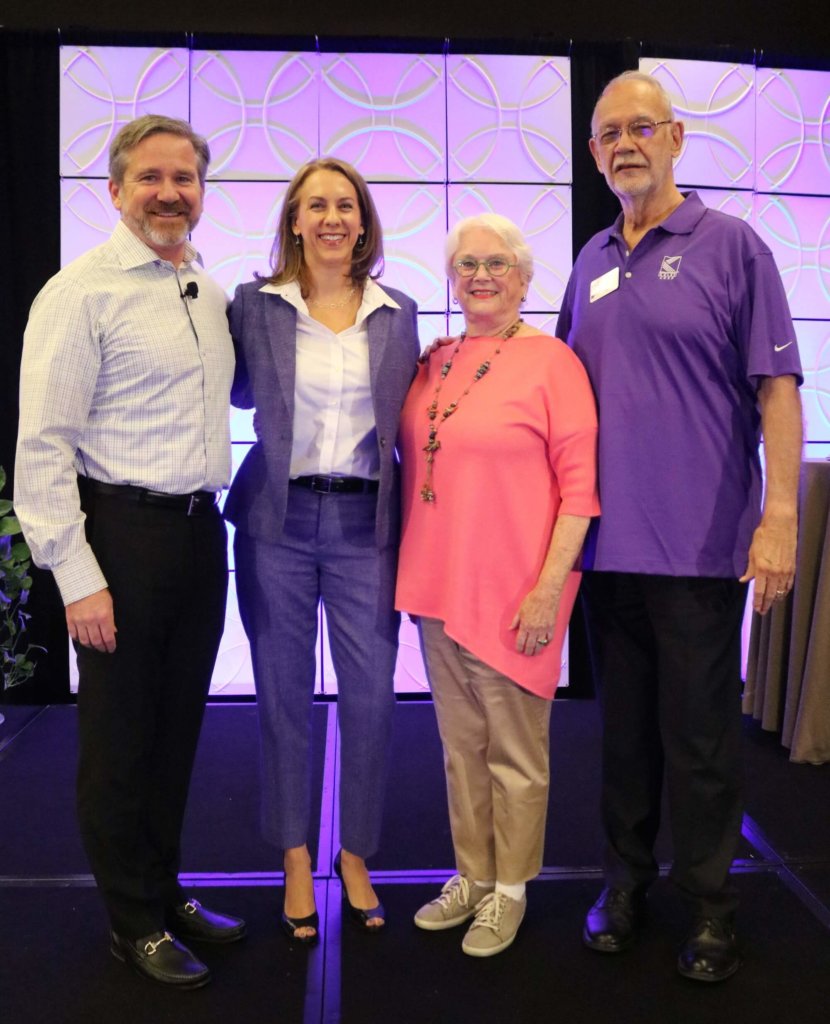Kathy Kolbe built her enterprise, Kolbe Corp, to help Fortune 500 companies, business executives and leaders in every sector excel using a system that identifies the individual talents driving universal work habits. Their latest book, Business is Business: Reality Checks for Family-Owned Companies, examines the critical task of defining boundaries between the personal and the professional, and finding joy in the process.
Their work is inspired by three decades of family business success. For a time, Kathy, Amy and Amy’s brother David all worked in Kolbe Corp. Kathy ran the business and eventually transitioned out of it. They lived the experience of succession – coming up through the ranks and figuring out how to run the business together. David and Amy, now CEO and President, respectively, are proof that working towards individual strengths and implementing healthy boundaries are successful strategies for generating family businesses sustainability.
Tharawat Magazine had the opportunity to speak with Amy Bruske about keeping the business and family separate, firing family members and hiring strategies for family business success.

What do you hope readers take away from your book?
The business needs to stay separate from other areas of life. Business tasks and decision-making happen at the business. Outside of the business, personal life takes precedence, and it’s essential that boundaries exist between the two. Establishing these boundaries is the number one challenge for the family businesses we work with.
Implementing this separation is easier if the process begins early. A dialogue addressing the issue should begin at the foundational stage.
To do so, however, family members must be comfortable enough to call each other out when they’ve broached personal subjects or let personal issues bias their judgement in business activities. We empower our team members, some of whom have been with us for a very long time, to call us out if we step over these boundaries. The existence and maintenance of these barriers are critical to our future success.

How can businesses honour these boundaries when hiring family members?
First, address expectations: there are no guarantees. Treat the situation as if there is a strong chance it won’t work out and have an exit plan – but be overjoyed if it does.
To ensure success, however, the process should start even sooner. Business owners should reflect on whether or not they would have hired their family member if they were not a member of the family.
One mistake we often see involves a founder desperately wanting their children to join the business. Invariably, succession becomes an ad hoc, rushed process that doesn’t give the successor or the incumbent leader a chance to succeed in their new roles.

Working externally before joining the family business is vital. The most formidable business leaders have also found success elsewhere. Outside successes build confidence in next-gen leaders and give them something to contribute to. As importantly, others in the organisation have greater respect for individuals with experience and accomplishments outside of the business.
Next, family business leaders must create roles that work with the individual strengths of people in their organisation. When hiring, the job has to be a great fit based on the skills an individual has or is clearly capable of acquiring. Lastly, their position should reflect how they execute or get things done.
It’s the job of the recruiting family member to set their new hire up for success in the organisation. However, if for some reason it doesn’t work out, and the family member needs to be fired, then the no-guarantees groundwork that was established helps preserve the family relationship. The dynamic this requires is reinforced by the separation of the business from the personal.

“Family business members need to recognise when family dynamics are causing an issue in the business.”
How can healthy communication practices help establish this boundary?
When we need to have a personal conversation, we leave the office and go to a place where we can speak freely. If one of us brings up the past unnecessarily, they get called out, because discussing past pain rarely helps move the current situation forward.
Regardless of the approach, communication itself is the most important part. Family business members need to recognise when family dynamics are causing an issue in the business. Coaches or therapists who can help them talk through grievances, identifying when past family matters are driving a reaction in the present, are indispensable.
How does the Kolbe A™ Index contribute to this awareness?
The Kolbe A™ Index is a system that examines how individuals execute naturally. It’s not based on personality; it identifies how people take action. When others in a business setting know their co-workers’ motivations, then they don’t take problems personally. For example, one employee operates best by exploring issues in detail, while their co-worker strives to simplify. If they understand and accept these aspects in each other, then they aren’t personally offended when their habits don’t meld.
The Kolbe Solution gives family businesses an objective tool to help define what activities are best suited to their workplace. We wish to see entrepreneurs and entrepreneurial businesses building teams around their strengths and celebrating the unique attributes of individual team members. Differences provide a healthy team dynamic – it’s this diversity of talent that prevents groupthink in an organisation. Businesses don’t grow if they don’t employ people with a variety of strengths and various ways of executing.
“People who can work as effectively on a team as they can individually are valuable assets.”
What should recruiters look for to ensure future sustainability?
We should focus on hiring problem-solvers. People cannot sit around and wait to be told what to do, especially in a rapidly growing business. Companies need employees that can solve problems, know when to get help and have a clear idea about their own strengths and how to build on them.
People who can work as effectively on a team as they can individually are valuable assets. I see a tendency towards over-collaboration right now, especially in our Fortune 500 clients. This highlights how important it is to find people who function well in a team but are not overly reliant on others.
Hiring people with a modern technological skillset and making room for them in the organisation is another priority. This is especially true for family businesses. Sometimes, ageing family members insist on processes that are no longer relevant, ignoring next-generation strengths and know-how. There must be the expectation that all generations contribute to sustainability. Here, mutual respect is essential.
As business leaders, we foment sustainability by identifying the strengths of individuals and placing them in situations where they are going to succeed. We must establish how our teams execute and play to those strengths. Businesses change, but this doesn’t mean that business leaders have to drive change. Instead, we need to manage our employees in a way that ensures that change is for the positive.














